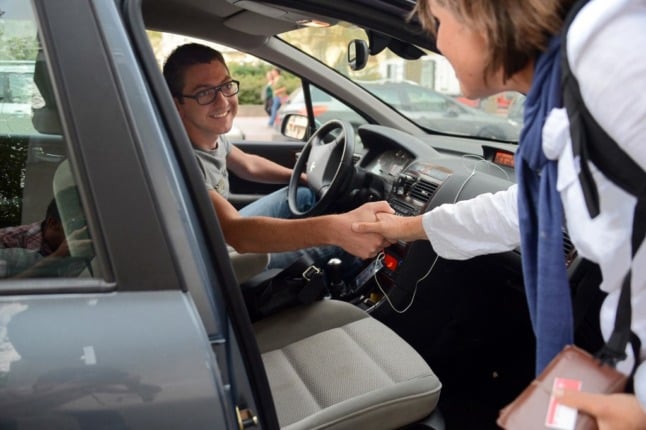Whether you only need a car for weekend trips, you’re looking to save money on your daily commute or you just want a cheaper way of travelling around Spain and abroad, carpooling apps could be an ideal solution for moving around in Spain.
What are the advantages of carpooling in Spain?
Firstly, carpooling can save you a lot of money at a time when transport costs have become increasingly expensive in Spain.
By sharing expenses with others, it’s estimated that you can save up to 75 percent of the price of just going alone. As a driver, it means that you can earn money to help pay for your trips and as a passenger, it means that you don’t need to worry about the extra expenses of hiring or owning your own car.
Secondly, car sharing is ultimately helping the environment, reducing the number of cars on the road and the CO2 that they produce.
Lastly, it can also be seen as a great way to meet new people. If you’re travelling around Spain, it can be much for fun to travel with and get tips from the locals, rather than driving alone.
Around 80 percent of Spain’s population live in urban areas, many of which are densely packed and easy to get around on foot or have great public transport networks, meaning that owning your own car isn’t always necessary. This means that you can easily rely on carpooling apps when you need to.
READ ALSO – Driving in Spain: What are the extra costs of owning a car?
How do carpooling apps work?
Most of the time, someone with a car will create a route and post it up online, stating when they are going and how many spaces they have available. You can usually search by route and if someone has created one that you want to go on, you can simply sign up.
Each platform works in a slightly different way, see below for eight of the best and how each one operates.
BlaBla Car
BlaBla Car is probably one of the most well-known and most popular carpooling apps in Spain. This is because it’s also the largest car-sharing app in the world with more than 65 million users, five million of which are in Spain. This means that BlaBla Car is also one of the best options for travel from Spain to other countries, such as nearby France and Portugal. The app also has a section called Smart Stopover, allowing for better connections between smaller towns and villages.
When you book a trip you can access data about the driver such as name, age, and type of vehicle they drive. You can also see opinions and ratings from other passengers who have travelled with them. When the journey is over, the passenger and the driver can both give each other a score.
The company recommended a contribution of around €0.06 per kilometre and limits the maximum contribution that drivers can request, to ensure that there is no profit on the journey. Management fees from the app range from €1 (when contributions range from €1 to €6) to 17 percent of the contribution when it exceeds €51.
READ ALSO: The tricks drivers use to pay less in car taxes in Spain
AmiCoche
AmiCoche is a free Spanish-created car-sharing platform, which aims to promote car sharing in Spain and Europe without profit. Payments are made in cash directly to the driver and not via the app.
Drivers can publish a particular route and passengers can search for routes to see if anyone has created one where they want to go.
DriiveMe
DriiveMe is a little different from just simply a car-sharing app, because it also allows you to hire cars and vans for as little as €1 for 24 hours. It also offers moving services and vehicle transfer services.
The car hire is so cheap because the fleet of vehicles it uses are those that need to be transported to different locations around Spain. In this way, the company saves money on employing drivers to transport them.
This does mean however, that while you can deviate from the route a little and take extra time, you do ultimately have to arrive at a particular destination at a certain time, so you don’t have as much freedom as regular car hire companies.
Compartir Coche
Compartir Coche is a network of companies and organisations that promote car-sharing services. It is completely free to use and sign up and there are around 78,000 registered users.
It operates in 68 countries, so you can also use it when you want to travel abroad, not only within Spain.

Amovens
Amovens is similar to BlaBla Car in that it is up to the driver to create the route and accept passengers to join them on their journey. It has around 1.5 million users in Spain and scores are given for both drivers and passengers, so you see what the people are like before you travel with them.
Management fees cost 10 percent of the total with a minimum of €1. The company also offers the option for car cheap car rentals, either for the day or for the month, if you want to use one regularly.
DedoCar
DedoCar is more geared towards people who want car sharing for regular journeys, such as travelling to work, so could be good for those who live in cities or in urban areas outside cities and need to travel in every day.
According to DedoCar “in Madrid 4,000,000 free seats are being wasted per day, and most of them can be used at rush hour”.
Travel expenses are automatically divided between the number of passengers in the car, based on the distance travelled by each one. The idea is that the driver can pick up and drop off different passengers at different points along their daily commutes.
Viajamos Juntos
Viajamos Juntos, translates as ‘We Travel Together’ and is a free carpooling platform used in both Spain and Argentina. It has been around since 2004 and operates in a similar manner to AmiCoche.
Compartocoche
For Compartocoche, both the driver and the potential passenger can create routes to try to find people who want to share their journey. The company also places special emphasis on drivers who want to use VAO or High Occupancy Vehicles lanes in big cities like Madrid, so it could be good for regular routes such as going to work or university.



 Please whitelist us to continue reading.
Please whitelist us to continue reading.
Member comments